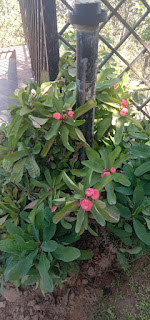Just the other day, as I meandered thoughtfully on my morning walk in Jaipur, stopping to look closely at a cluster of swaying, wildflowers, peering closely at a grasshopper camouflaged in the green grass, mesmerized by the sight of an egret merrily perched on a cow’s back, and a pair of love- besotted sparrows necking and kissing, I was yanked out of my thoughts, by the squawk of a lapwing. A snapshot of memories flashed before my eyes.
Let me relate a few once-upon a time stories.
A kid on my summer vacation to Srinagar, Kashmir, at our ancestral house on the banks of the Jhelum, looking down below at the houseboats standing still on the waters, wondering why the water should look so unclean. A pair of lapwings cruised overhead, kay-kay-ing away. I heard a voice behind me.
My mother’s.
“The waters used to be sparkling blue when I came here as a newly wedded bride”. She said, wistfully. The sunlight was falling on her face, and she glowed, despite that wistful look.
I watched her, mesmerized, her face reflecting the summertime glee.
Seasons came and went. I fell in love with the autumnal hues, gasping at the sight of luxuriant tresses of the willow trees falling off. The lotus leaves wilted, and the magical smell of the dense pine forests, the golden aura of cut paddy, stacked in piles to dry, remained etched in memory. To me the world seemed to twinkle with a crystalline delight, and I could clearly hear the melody inherent in nature. A melody in every particle, boulder, ripple and roar. With Edgar Allen Poe, I would find myself reciting,
“What a world of merriment their melody foretells”.* 1
Again a once-upon a time story.
Now I was in Jammu, leaning against the railing, surrounding our rambling verdant garden, looking down at the Tawi River, intrigued by a profusion of wild flowers in full bloom, swaying with the breeze.
In the far distance, the hills were silhouetted in the mist.
The River rippled and roared rapturously, flaunting its crystalline water, which reflected the aquamarine hues of the sky. It appeared brimming with sublime energy. With delirious joy, we swam and waded, squealed, and splashed. A group of women from the shacks bathed, exchanging small talk and laughing boisterously. Every now and then we caught sight of a curlew, absolutely fascinated by its long, slender, down-curved bills, and dull brown plumage.
“Have you heard their call at night?” One of the men who worked in my brother’s house asked.
“They call to divert the predators away from their eggs and young ones.”
Time again flew.
Things changed drastically. When we visited Jammu a few months back, it suddenly struck me with the blow of a hammer that the Tawi had shrunk in size and sported a funereal air, looking emaciated, aged, lackadaisical, and, very slow in its responses.
It was summer, but the waters now had the tint of winter gray.
I was aghast to see that land mining was going on full throttle, half a dozen trucks stood on the bank, which was fringed with heaps of garbage. A couple of mongrels lazed, next to the trucks.
In the motes of the sunlight, I could hear the muffled, tangled notes of a long-gone era, trying to be liberated.
From the railing, I saw myself reflected in the waves, flailing my arms, trying to catch slivers of a golden past. But I could only catch some sardonic and wry verses trying to poke fun at me-
just an incoherent succession of vacuous, hollow sounds.
I stood there trying to read meaning in the silence of the Tawi River.
But I heard only warning bells, followed by ominous sounds like never before.
The lapwing overhead shrieked and shrieked, trying to catch attention.
I turned to look back and gasped.
My mind was playing tricks; mother stood behind me, her face haloed by the sun rays.
A sigh escaped my lips. She looked so small, shrunken – a shadow of her buoyant self.
A far cry from a mother, whose solicitous reprimands had followed me when I was a kid.
“You are an elf, get down from that tree.”
With a heavy heart, I headed back toward my mom’s room, and stopped in my tracks-
to find myself reflected in the glass of my mother’s window- of a window of an empty room, from which mother had flown.
On the swing near the railing perched a magpie robin, trying to catch those notes, which were lost in the air- and would be salvaged someday. Hopefully.
Down below, the Tawi continued humming that unfinished elegy.
Night fell, and the call of the curlew pierced the silence.
Was some predator stalking its young ones? The call became shriller. Alarm bells started ringing in my ears.
In the call of the curlew, I almost heard the groans of a mother – Mother Earth.
I slipped under the duvet, hoping for a miraculous, magical, healing touch. But, I don’t know, why I could only hear Poe!
“Hear the loud alarum bells-
Brazen Bells!
What a tale of terror, now, their
turbulency tells!
In the startled ear of night
How they scream out their affright!”*2
I continued hearing the clanging, twanging, clashing, and roaring of bells, spewing ominous warnings.
Then there was silence.
More ominous than the sinister clanging of bells.
Then a long-winding groan.
Through my peripheral vision, I saw my frail mother, waving out to me-
a sad smile plastered on her face.
*The Bells 1 and 2 Edgar Allen Poe



The nostalgic flavour of Jammu drenched me initially Santosh di but the realisation that Mother Earth needs healing reawakened me from the dreaminess of the narrative. Beautifully crafted in your inimitable style di. Loved it. And thanks for the tag. ❤️
ReplyDelete